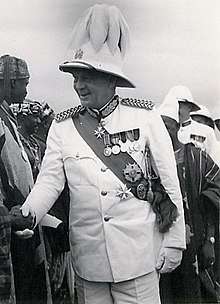Charles Arden-Clarke
Sir Charles Noble Arden-Clarke GCMG[3] (25 July 1898 – 16 December 1962) was a British colonial administrator.
Sir Charles Noble Arden-Clarke GCMG | |
|---|---|
 | |
| Governor-General of Ghana | |
| In office 6 March 1957 – 24 June 1957 | |
| Monarch | Elizabeth II |
| Prime Minister | Kwame Nkrumah (6 March 1957 – 1 July 1960) |
| Preceded by | Newly created position |
| Succeeded by | Lord Listowel |
| Governor of the Gold Coast | |
| In office 11 August 1949 – 6 March 1957 | |
| Prime Minister | Kwame Nkrumah (21 March 1952 – 6 March 1957) |
| Preceded by | Sir Robert Scott |
| Succeeded by | Position abolished |
| Resident Commissioner of Bechuanaland | |
| In office 1937–1942 | |
| Preceded by | Charles Fernand Rey |
| Succeeded by | Aubrey Denzil Forsyth-Thompson |
| First Governor of Sarawak | |
| In office 1 July 1946 – 26 July 1949 | |
| Monarch | George VI |
| Preceded by | Newly created position |
| Succeeded by | Duncan George Stewart |
| Personal details | |
| Born | 25 July 1898[1] Bournemouth, England |
| Died | 16 December 1962 (aged 64)[2] Syleham, England |
Arden-Clarke was educated at Rossall School.[4] He was the Resident Commissioner of the Bechuanaland Protectorate (later Botswana) between 1937 and 1942, a time at which the ruling regent Tshekedi Khama was in violent conflict with the British authorities.[5] He was the Resident Commissioner of Basutoland from August 1942 to November 1946, and in 1946 was appointed as the first Governor of the newly created British Crown Colony of Sarawak, which was ceded in 1946 by the Kingdom of Sarawak. During his governorship in Sarawak he was despised by locals as, upon his appointment, Sarawak was engulfed with the Anti-cession Movement, which led to the assassination of his successor, Duncan Stewart in 1949 by the radical members of the Anti-cession movement.
After Sarawak, he was the last governor of the Gold Coast from August 1949[5] until 1957 (later Ghana). On 12 February 1951, he authorised Kwame Nkrumah's release from imprisonment in James Fort. After independence, he was named the first Governor-General of Ghana in 1957. Arden-Clarke's acceptance of the Africans and his attitude towards Kwame Nkrumah likely contributed to Ghana's relatively smooth transition to independence.
References
- Who's who of Southern Africa. Ken Donaldson (Pty.) Limited. 1959.
- African Affairs. Royal African Society. 1968.
- 1952_New_Year_Honours
- "Arden-Clarke, Sir Charles Noble". Who's Who. A & C Black, an imprint of Bloomsbury Publishing plc. (subscription or UK public library membership required)
- David Birmingham (1998). Kwame Nkrumah: The Father of African Nationalism (Rev. ed.). Ohio University Press. pp. 38–39. ISBN 978-0-8214-1242-8.
| Government offices | ||
|---|---|---|
| Preceded by Charles Fernand Rey |
Resident Commissioner of Bechuanaland 1937–19421 |
Succeeded by Aubrey Denzil Forsyth-Thompson |
| New creation | Governor of Sarawak 1946–19492 |
Succeeded by Duncan George Stewart |
| Preceded by Sir Robert Scott |
Governor of the Gold Coast 1949–19573 |
Post abolished |
| New creation | Governor-General of Ghana 19573 |
Succeeded by The Earl of Listowel |
| Notes and references | ||
| 1. http://www.rulers.org/rulb1.html#botswana 2. http://www.rulers.org/rulg1.html#ghana | ||